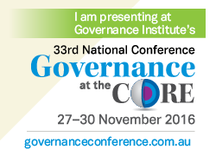|
The end of 2023 is nigh; consequently, minds have turned to end-of-year celebrations, various secular and religious festivals, and, inevitably, reflections. Twenty twenty-three has been a standout year for me for several reasons, not the least of which have been many expressions of encouragement, support and endorsement as I have sought to help boards govern with impact. That I have had the opportunity to contribute is a delight. But more than this, the seemingly simple fact that directors, boards, shareholders, institutions and others invite me to advise, assess, educate, speak and otherwise provide counsel, is a great honour. Thank you to everyone who has sought me during the year and entrusted your situations to me. These are cherished interactions. As I sit back, in these final hours of the 'business' year, I have found myself pondering 'reach'. This, a response to a question from a friend who, knowing of my recent trip to Kenya, wanted to know how many countries I had visited in 2023. When I checked back, this is what I discovered:
Superficially, this sounds like a busy year. And it has been. But, I hasten to add these data are neither targets nor badges of honour. They are, simply, footprints: evidence of my travels as I have sought to help boards govern with impact over the past year. Looking to 2024, my intent is to continue to serve—subject to boards and directors wanting guidance, of course! For now though, my objective is more selfish: it is relax, read and recharge, in readiness for what lies ahead. Best wishes as you close out 2023, and turn the page to reveal 2024.
0 Comments
And there you have it: before many of us realised, the solar equinox has passed once more—that moment when the sun passes the celestial equator and winter (or, for those in the global south, summer) beckons. The equinox also signals the recommencement of on-the-ground contributions in the Northern Hemisphere. To wit, I shall be in the United Kingdom and Switzerland soon—from 2nd through 13th October, in fact. My programme sees me in London, Leeds, Cambridge, Zurich and St. Gallen, for a variety of contributions:
I am looking forward to hearing the heartbeat of company directors, advisors and others, to understand recent developments and emerging trends, and to discern changes since I visited earlier this year. I have intentionally held space available for a few informal meetings. So, if you want to meet up while I am in your neighbourhood—be it to discuss the work and impact of boards, corporate governance, or some other topic of interest—do get in touch. I would be delighted to hear from you.
The passing of the Covid pandemic has been a great relief for many; boards of directors are no exception. Several weeks ago, I visited Sydney, Australia to meet with directors, boards and leaders of membership bodies. The feedback was clear: if companies (and through them, economies and societies) are to prosper, boards need to start thinking strategically again. Last week, more grist to the mill. During a successful visit to Bengaluru, India to lead a Board Immersion Programme for a globally-known FMCG company, the question of how boards can add value was front-of-mind throughout. Today, I'm delighted to announce my first post-Covid visit to the United Kingdom and Europe, to continue the advisory work there. From November 16th through 25th, I will visit the UK, several EU countries, and elsewhere as required, to respond to requests to speak, and to help boards respond well as they pursue sustainable business performance. This includes:
Do you want to meet in November? Regardless of whether you have a specific request or a general question, please get in touch. I'll respond promptly with some suggestions for your consideration.
Today marks the beginning of a lull following a busy programme of international and domestic commitments since early February. Over a 110-day period, I have spent time in Australia (four times), England (twice), the US (twice), Germany (twice), Ireland, Sweden and Lithuania—and at home in New Zealand; interacting with over 520 directors, chairs and chief executives from 19 countries. Formal and informal discussions at conferences, seminars, masterclass sessions, education workshops, dinners, advisory engagements and board meetings were instructive to understanding what's currently top-of-mind for boards around the world. The following notes are a brief summation of my observations. I hope you find them useful. Diversity and inclusion: These topics continue to dominate governance discussions in many countries. But, and noticeably, the discourse has matured somewhat over the last six months. The frequency with which the rather blunt (and often politically-motivated) instruments of gender and quota is mentioned is starting to subside, as directors and nomination committees start to realise the importance of diverse perspectives and options to inform strategic thinking and strategising. Long may this continue, as board effectiveness is dependent on what boards do, not what they look like. Big data and AI: What a hot topic! Globally, boards are being encouraged by, inter alia, futurists, academics and consultants to get on board (if you'll excuse the pun) with the promise that developments in this area will change the face of decision-making and improve corporate governance. Some assert that these developments will obviate the need for board of directors in just a few years. The directors I spoke with agree that these tools can help managers make sense of complex data to produce information, even knowledge. But these same directors have significant reservations when it comes to strategic decision-making. Automated systems are poor substitutes for humans when it comes to making sense of (even recognising) contextual nuances, non-verbal cues and other subtleties. Unless and until this changes, the likelihood that boards will continue to be comprised of real people engaged in meaningful discussion remains high. Corporate governance codes: The number of corporate governance codes introduced in markets has been steadily rising over the last decade. Most western nations, and a growing number of Asian and developing nations, have implemented codes to supplement statutory arrangements. Many directors and institutions around the world continue to look to proclamations that the UK is the vanguard when it comes to corporate governance thinking and related guidance: the recently-updated UK corporate governance and stewardship codes are held up as evidence of good practice. While the quality of board work in the UK has improved over the last decade, a strong compliance focus continues the pervade director thinking—across the business community in the UK and beyond. The reason is stark: codes are little more than rulebooks. Further, rules don't drive performance, they define boundaries. The more time boards spend either complying with the rules or finding ways to get around them, the less time is left for what actually matters, company performance. In many discussions over the past few months, I've pointed people to the ground-breaking work of contributors such as Bob Tricker, Sir Adrian Cadbury and Bob Garratt. These doyens provided much-needed impetus to help boards understand their responsibility for company performance. The emergent opportunity for regulators and directors' institutions is to consider alternative responses to ineptitude and malfeasance: instead of creating more rules all the time, why not hold boards to account to the existing statutes, most of which seem to be eminently suitable? Best practice: Many individual directors (and boards collectively) are starting to move beyond 'best practice' as an aspirational goal. Further, directors and boards are demanding to hear educators and thinkers who are also practicing directors, not trainers delivering off-the-shelf courses. Context is everything. The evidence? When a director asks to explore the difference between theory and practice you know something in his prior experience has missed the mark. Practising directors know that the board is a complex and socially-dynamic entity, and that the operational environment is far from static. Directors' institutes, consulting firms and trainers need to stake stock and move beyond definitive 'best practice' claims, lest they be left behind and become monuments to irrelevance. Enough said. Governance remains a fashionable topic: If I had a dollar every time I've heard 'governance' promoted as a career in recent months, or the term used in discussions (including, sadly, often inappropriately), I would be really well off. But the act of invoking a term during a discussion is no panacea to whatever situation is being discussed. More capable directors are needed to contribute to the effective governance of enterprises, of that I am sure. But the established pattern of selecting directors from a pool of seemingly successful executives—as if a reward—is folly. The findings from a growing number of failure studies from around the world attest to this. The role of a director is quite different from that of a manager or executive. Managers and executives have hierarchical authority and decisions are made by individuals. In contrast, directors lead by influence and decisions are always collective. The challenge for those aspiring to receive a board appointment is to set their managerial mindset aside, to enable a more strategic mindset and commitment to the tenet of collective responsibility to emerge. Standing back from these interactions, the board landscape seems troubled. But I remain hopeful. Progress is being made (albeit more slowly than many would wish) and a pattern is slowly emerging. Increasing numbers of directors are acknowledging that the board's primary role is to ensure performance goals are achieved, and that the appropriate motivation for effective boardroom contributions is service, not self. The challenge is to press on. If the number of requests from those wanting to understand what capabilities are needed in directors, what boards need to do before and during board meetings, and desirable behavioural characteristics is any indication, boards are getting more serious about making a difference—and that points to a brighter future. If a tipping point can be reached, arguments centred on board structure and composition that have dominated the discourse can be consigned to their rightful place: history. I look forward to that day.
In a couple of weeks, I'll be in England and Europe, for the third and final time this year. The schedule includes attendance at two conferences, delivery of two keynotes and a bevy of meetings, as follows:
While the schedule is fairly full, some gaps remain for additional meetings (in London). If you would like to meet, please get in touch. I'd be glad to discuss any aspect of boards, corporate governance or effective board practice; explore a research idea; or respond to (future) speaking or advisory enquiries.
This is the second of two instalments summarising observations from my recent two-week skip across Western Europe. This summary covers the UK leg of the trip. You can read the first instalment here; the European leg. The trip was framed around four objectives, namely, to share learnings from my recently completed doctoral research and discuss the implications for boards; fulfil some speaking engagements; discuss emerging trends with boards; and, attend a training course. After travelling between cities (actually, countries) every day during the first week, the second week was much more settled. I was based in London for two-and-a-half days for meetings at institutions and with directors. The balance of the week saw me at Cambridge University, for a training course. Here's a brief summary of the key observations:
If you would like to know more about these observations, please get in touch.
The level of interest in board effectiveness and good governance outcomes seems to be growing, or so it seems if the number of advisory, speaking and workshop enquiries that have arrived in recent weeks is any indication. Already, 2017 is shaping up to be busier than last year! My first trip to the UK and EU for 2017 is scheduled for mid-March. The programme is starting to take shape, as follows. Commitments include speaking engagements (topics: the board's role in value creation, emerging trends and findings from my latest research), workshops (board capability development), advisory meetings and a training course. EDIT (30 Jan): My diary is now nearly full—the only remaining opportunities to book a meeting are in London. If you want to meet, but not in March, or if you want to discuss the possibility of an engagement in the future, please register your interest. At this stage, it is my intention to return to the UK and EU in June and September.
Entrepreneurs—that group of individuals who put their resources and, often, their reputation on the line, in pursuit of a big dream—are interesting people. Some are brash and larger than life; others are quieter and more considered. Despite variations in style and personality, one common thread that binds entrepreneurs is the importance of leveraging (often limited) resources to best advantage to maximise the chance of seeing their dream realised. One important and oft-overlooked resource is the board of directors. Some of the questions I've heard entrepreneurs ask include:
I will be in Brisbane Australia on Tue 7 February 2017 to help entrepreneurs and directors of entrepreneurial businesses explore these questions. The Brisbane branch of Entrepreneurs' Organisation, a global network of more than 10,000 business owners in 42 countries, has invited me to deliver a talk and to host a workshop for members. The title of the two sessions are as follows:
If you would like to know more, follow the link, or get in touch with the team at EO Brisbane Events.
 The Governance Institute of Australia's national conference starts on Sunday 27 November at the Hilton Hotel in the Sydney CBD. I'll be at the conference on 28–29 Nov(*) to listen to what looks like a great lineup of speakers, and to serve as a panelist on Tue 29. The panel topic is "The pursuit of productivity". If you're going to be at the GIA conference and want to say hello, please feel free to phone me or send an SMS. My number is here. Following the conference, I will remain in Sydney for two more days (Wed 30 Nov and Thu 1 Dec) for private meetings. If you would like to take advantage of my proximity to chat about corporate governance; board effectiveness; corporate strategy; emerging trends and the findings from my recent research; or, any related matter of interest, I'd be delighted to make a time to meet. Please get in touch to set up a meeting. Currently, there are several gaps in my diary including dinner on Wed 30 Now and breakfast on Thu 1 Dec. (*) Session summaries will be posted here throughout the conference. Please check back if you are interested.
I'm thrilled to announce that the Madinah Institute for Leadership and Entrepreneurship (MILE) has invited me to present a webinar entitled Influencing company performance, from the boardroom. The webinar will start at 3:00pm Saudi time on Sunday 2 October—to suit American, UK/European, Middle Eastern, African and Asian company directors and board members in particular. For more information, click here. You'll need to register (free). The following topics will be discussed during the 45-minute webinar (with an open Q&A session afterwards):
Reserve your place today!
|
SearchMusingsThoughts on corporate governance, strategy and boardcraft; our place in the world; and other topics that catch my attention. Categories
All
Archives
May 2024
|
|
Dr. Peter Crow, CMInstD
|
© Copyright 2001-2024 | Terms of use & privacy
|











